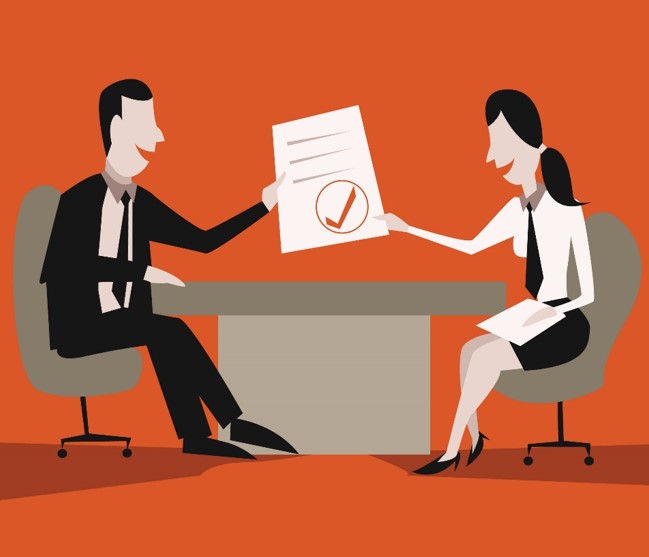|
A job interview is a
presentation, a performance, and an audition. If you
are granted an interview, it means you have
successfully grabbed the attention of an employer
who has decided to meet with you in person,
face-to-face. The employer has some idea that you
might be qualified for the job, otherwise he would
not be committing valuable time to seeing you.

Interview
Attire
Interview Prep Sheet
Interview
Reflection
To be successful in a job interview means putting
your "best self" forward. Preparing for an interview
involves sharpening your communication skills,
anticipating certain questions, projecting
confidence, maintaining a positive attitude,
displaying enthusiasm, emphasizing your best
attributes, expressing your personality, and
creating a good first impression. It is important to
stress your skills, abilities, and strengths. You
must clearly and confidently communicate your
accomplishments and achievements.
To be successful in a job interview means putting
your "best self" forward. Preparing for an interview
involves sharpening your communication skills,
anticipating certain questions, projecting
confidence, maintaining a positive attitude,
displaying enthusiasm, emphasizing your best
attributes, expressing your personality, and
creating a good first impression. It is important to
stress your skills, abilities, and strengths. You
must clearly and confidently communicate your
accomplishments and achievements.
Interview
Preparation Video
Interview Prep: Tell
Me About Yourself
Interview Videos
STAR
Method: Prepping for Behavioral Interviews
Behavioral Interview Techniques and Strategies
Questions With No Right or Wrong Answer
Interview Advice and Techniques
Ten Critical Interview Skills
How to Ace the Job
Interview

EMPLOYER'S NEEDS
Approach your interview from the employer’s
perspective. It is important that you focus only on
relevant traits and attributes. You should tailor
your presentation so as to emphasize your specific
qualifications as they relate to the requirements of
the job in question. Target all of your comments and
remarks to the employer’s concerns. Put yourself in
the employer's shoes.
Keep focused on what you can do for the employer
rather than what the employer can do for you. Keep
in mind the specific needs, interests, values, and
biases of the employer. Address the issues that you
know the employer cares about. Match your
qualifications to their needs. Make your comments
employer-centered rather than self-centered. Speak
the employer's language. Be sure all your statements
answer the underlying most important question: "What
can you do for our organization?"
Interview
Attire
Interview Prep Sheet
Interview
Reflection
PREPARATION
Do your homework. Prepare in advance for your job
interview by doing some in-depth research. Gather
useful information about the employer. Be informed
and knowledgeable about the company and the job.
Plan ahead. Organize and outline your main ideas in
advance. Determine your key qualifications. Spell
out specific details of your background and
credentials and commit to memory the major points of
your presentation.
Rehearse your presentation beforehand by conducting
a mock interview. Practice formulating and
expressing your responses to potential questions.
PRESENTATION
Dress appropriately. Arrive on time. Maintain good
eye contact. Observe proper protocol and good
etiquette. Use proper grammar. Offer a solid
handshake. Be alert. Listen carefully.
Bring along a portfolio containing a collection of
impressive examples of your work, letters of
reference, and awards. Bring extra copies of your
resume.

PERFORMANCE
Relate a few relevant stories, testimonials, or
anecdotal examples as a way of providing supportive
evidence of your skills and abilities. Telling
stories also allows you the opportunity to
communicate positive feelings and emotions, a sense
of enthusiasm, pride, and dedication.
Ask appropriate questions. Prepare a few good solid
questions in advance. Don't ask about salary and
benefits. Ask questions that reflect your
professional attitude and motivation. Express an
interest in wanting to learn more about the company.
Interview
Preparation Video
Interview Prep: Tell
Me About Yourself
Interview Videos
STAR
Method: Prepping for Behavioral Interviews
Behavioral Interview Techniques and Strategies
Questions With No Right or Wrong Answer
Interview Advice and Techniques
Ten Critical Interview Skills
How to Ace the Job
Interview
WRAP UP
At the end of the interview, make a closing
statement. In that statement, you can express
gratitude for the interview and summarize your main
points. Indicate how your qualifications match the
needs of the company. State confidently your
assertion that you can make a worthwhile
contribution to the company. And then, finally, ask
for the job.
Always send a follow-up letter immediately after the
interview as a way of thanking the employer and
reiterating your interest in the job.

PLAN AHEAD
It is vital to your presentation that you prepare in
advance. Being prepared for a job interview will
help you to feel more comfortable with the process
and more confident in yourself. It is important that
you project a sense of confidence that arises from
good solid advanced planning and thorough
preparation.
Interview
Attire
Interview Prep Sheet
Interview
Reflection
RESEARCH
Prepare for your job interview by conducting
in-depth research. Gather useful background
information and data about the company you intend to
interview with. Learn as much as you can about the
employer. Be informed about the job. You must
present yourself as knowledgeable of their business,
their market, their customers, their competition,
their product, and their line of work.
Do your homework. Where can this valuable
information be obtained? The public library, chamber
of commerce, business publications, industrial
guides, company literature, annual reports, employee
handbooks, magazine articles, and on the company’s
website.

MAIN IDEAS
Know who you are and what you have to offer. Know
the qualifications for the job. Know your sales
pitch by heart. Plan your promotional spiel in
advance.
Determine your key qualifications. Identify your
unique strengths, abilities, and skills. Write them
down. Learn them. Organize and outline your main
ideas in advance. Commit to memory the major points
of your presentation.
Compose a list your traits accordingly:
--Your knowledge, education,
training, coursework
--Your experience, activities, relevant employment
--Your relevant or transferable skills
--Your personality traits or soft skills
--Your goals and motivations

|

|
Job Market
Strategies
Networking Techniques
Resume
Writing
Skills
Employers Value
SHOW & TELL
It is recommend that candidates carry a leather portfolio to the interview. In
it you can store extra copies of your resume, your reference list (or reference
letters), and perhaps a copy of your college transcript. Also, the portfolio
should contain blank paper to jot down any notes.
If appropriate for your particular field, also prepare a presentation portfolio
containing a collection of impressive examples of your work, your resume,
letters of reference, and awards. A presentation portfolio is a tangible
collection of artifacts and samples that will help your interview come alive.
You should refer to it (using it like a prop) during the interview, flipping to
specific pages and pointing out specific examples.

Interview
Attire
Interview Prep Sheet
Interview
Reflection
ATTITUDE
Beyond being the most qualified candidate, you are seeking to be the “best fit”
for the job. Throughout the job interview, the successful candidate will seek to
project an acceptable image to the interviewer. It is critical to exhibit a
positive attitude and a pleasant personality. Since the interview process tends
to be a highly subjective and personal process, all preparation in this regard
involves five simple attitudinal principles…
--Be Respectful
--Be Relevant
--Be Positive
--Be Confident
--Be Genuine
STORYTIME
Recall a few relevant stories you can tell during the interview and compile a
list of these stories beforehand. These well-chosen stories or anecdotal
examples should reflect your past experience, set you in a positive light, and
provide supportive evidence of your skills and abilities.
Many interviews will ask content-based or scenario-based questions so as to
solicit stories from you. They may say, “Tell about a time when…” or “Give me an
example of…”
Also, telling a story allows you the opportunity to communicate positive
emotions and feelings, a sense of enthusiasm, pride, and dedication about your
work. Telling stories makes you more memorable to the interviewer.
Interview
Preparation Video
Interview Prep: Tell
Me About Yourself
Interview Videos
STAR
Method: Prepping for Behavioral Interviews
Behavioral Interview Techniques and Strategies
Questions With No Right or Wrong Answer
Interview Advice and Techniques
Ten Critical Interview Skills
How to Ace the Job
Interview

PREPARATION
Preparing for a job interview involves anticipating the questions employers are
likely to ask. It also involves rehearsing what you will say by practicing the
manner in which you formulate and express your responses. A big part of your
success in the interview will be based on how well you answered the questions.
Consider the following list of possible interview questions and think about how
you might answer them.
INTERVIEW QUESTIONS
FOR STARTERS
Tell me about yourself?
How would you describe yourself?
Why should I hire you?
What makes you the best candidate?
SAMPLE QUESTIONS
Why did you decide to seek employment with our company?
What do you know about our company?
What do you think it takes to be successful with our company?
What do you see yourself doing in five years?
What are your long-range career plans?
Why did you choose this occupation?
How would you describe your work style?
What do you consider to be your major strengths?
Name one of your greatest accomplishments?
How have your past experiences prepared you for future success?
What was the most important thing you learned in school?
What have you learned from your participation in extra-curricular activities?
In what ways do you think you can make a worthwhile contribution to our company?
How have other people described you?
What are you looking for in the ideal job?
What really motivates you to perform?
How do you determine or evaluate success?

CONTENT QUESTIONS
Many interviews conduct “behavioral” interviews. Be prepared to answer content
questions related to your field of expertise and provide specific examples and
stories. You may be asked about your philosophy or theoretical methodology. You
may be asked your opinion of critical issues in your field. You may be given a
scenario and asked what you would do in a particular situation. You may be
presented with a problem and asked to solve it.
Tell me about a time when you…
Give me an example of…
What would you do if...
BE CAREFUL
Be cautious in answering questions that call for discussion of potentially
negative subjects. Prepare in advance your best response to such inquiries.
What do you consider to be your major weaknesses or areas for improvement?
Why did you leave your last employer?
How do you handle yourself in a conflict?
How do you deal with criticism?
What was your greatest failure, and what did you learn from it?
How well do you work under pressure?
What have you learned from your mistakes?
Have you ever been on a team where someone was not pulling their own weight? How
did you handle it?
Tell me about the worst supervisor you ever worked for.
How would you handle a disgruntled customer?
Have you ever been fired from a job?
Have you ever been arrested?

Interview
Preparation Video
Interview Prep: Tell
Me About Yourself
Interview Videos
STAR
Method: Prepping for Behavioral Interviews
Behavioral Interview Techniques and Strategies
Questions With No Right or Wrong Answer
Interview Advice and Techniques
Ten Critical Interview Skills
How to Ace the Job
Interview
QUESTIONS TO ASK
When it's your turn to ask questions in the interview, you should be prepared
with a few good solid ones. Your questions should indicate your interest in the
company and the job. Ask job-related questions or questions related to your
functions and performance. Ask questions that reflect your professional attitude
and motivation.
Don’t ask self-centered or self-serving questions. Don't ask about salary or
benefits. Don’t ask questions that might tend to challenge or embarrass the
interviewer. Your interviewer is not your sparring partner.
What will my responsibilities be?
What will I be doing in a typical work day?
Where does this position fit in the overall organization?
What role will I play in helping the company achieve its goals?
How do you see me complementing the existing organization?
What are the most important qualifications for this position?
What will my priorities be?
What are the first projects to be addressed?
What are the major problems to be tackled?
What kind of leadership responsibilities will I have?
What kind of feedback will I receive from my supervisor?
How will my performance be evaluated?
What kind of training will I receive?
What professional development programs are available?
What are the prospects for advancement?
To whom will I be reporting?
What are the company's mission and goals?
What is unique about the way your company operates?
Who are the company's major competitors?
Who are your major customers?
What plans for expansion does the company anticipate?
What new endeavors is the company actively pursuing?
What current trends affect company growth and progress?
Interview
Attire
Interview Prep Sheet
Interview
Reflection

|